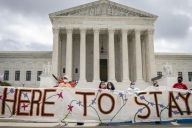You have /5 articles left.
Sign up for a free account or log in.

From left, the University of Kentucky, the University of Louisville and Northern Kentucky University, have all taken action related to proposed bans on DEI in the commonwealth.
Earlier this year, Kentucky’s Republican-led General Assembly considered multiple bills targeting public universities' diversity, equity and inclusion programs, but managed to pass none of them. By April, as their session neared its end, GOP lawmakers had run out of days to join other states that have cracked down on DEI—and still leave time to override Democratic governor Andy Beshear’s likely veto.
But Republicans didn’t forget the issue. In July, the Interim Joint Committee on Education, meeting between legislative sessions, held a hearing on DEI. During that meeting, as Louisville Public Media reported, Republican representative Emily Callaway said her son was exploring colleges, and she told Northern Kentucky University president Cady Short-Thompson that she was confused by something regarding NKU.
“I see Black student unions. I don’t see white anything,” Callaway said, according to a video from the General Assembly. “No mention. I see Black male/female events. My son, what would he relate to on your campus? And how is this inclusive? And how is it promoting unity while you segregate Black, white—well, we’re assuming there’s some whites that go there; we don’t know because there’s no mention of any activities for whites.”
Callaway said she was “having a problem understanding what the justification is when we use the term ‘diversity’ to exclude, very specifically, my son.”
Short-Thompson began her response by noting that “85 percent of NKU students are white” and defended NKU’s diversity efforts. “All students are welcome and included to attend any of the different groups,” she said. “There’s a place for everyone at Northern Kentucky University.”
Yet, a month and a half later, that same president wrote a message to her campus announcing a diminishment of DEI. Short-Thompson didn’t say that NKU was making changes to try and forestall anti-DEI legislation, but she alluded to a possible bill. “The circumstances under which universities across the commonwealth and the country find themselves, coupled with the legislative priorities of state leaders for the upcoming session, require universities to change,” she wrote.
Short-Thompson announced that NKU’s chief diversity officer had decided to step down immediately and that, “as such, I have decided to dissolve the Office of Inclusive Excellence”—the university’s central DEI office. She announced the chief human resources officer would be Title IX coordinator in the interim and said, “Our current array of wrap-around services and programs have helped our students to thrive and we’re committed to continuing them.”
NKU wasn’t going out on a limb in axing its central DEI office. Earlier in August, the state’s flagship public university, the University of Kentucky, had announced its own self-imposed disbanding of its Office for Institutional Diversity—again with glancing references to the potential that a forthcoming law would target DEI.
It appeared that the commonwealth’s public universities were starting to do what at least some lawmakers wanted them to—perhaps as a way to head off legislators going even further.
Lawmakers’ last, failed bill during the session was sweeping: It would’ve banned public colleges and universities from spending “any resources” on “diversity, equity and inclusion offices” or “initiatives,” with specialized definitions for those terms. But before the session ended, lawmakers did pass a bill that included a ban on "race-based metrics or targets" in the state's public college and university funding formulas. The Democratic governor signed it; The Lexington Herald-Leader reported that Beshear said he disagreed with that provision in the legislation but supported the extra funding that the law provided.
But then, last week, the board chair of the second-largest state university spoke out in favor of diversity instead of announcing concessions. “All means all. No exceptions,” University of Louisville board chair Diane Medley wrote in an op-ed in Kentucky newspapers, welcoming immigrants, rural students and others.
“As of fall 2023, students of color represent more than 28 percent of our enrollment,” she wrote. “More than 10 percent of our total student body, and 21 percent of students enrolled in U of L online programs, are military-connected students.”
While John Karman, a Louisville spokesman, didn’t provide interviews with university administrators Tuesday, he wrote in an email that “there are no plans to eliminate the UofL Office of Institutional Equity. The office serves all UofL students as they progress and complete their degrees.”
Will lawmakers, despite some universities’ own concessions, pass a bill anyway taking more sweeping measures against DEI? Or are the NKU and UK presidents simply implementing measures they or their boards already wanted, using the General Assembly as an excuse?
Whatever the case, the Kentucky General Assembly certainly looms over the decisions universities are making. “I don’t really know what kind of pressure the lawmakers are applying to these presidents,” said Jeremy Young, director of the Freedom to Learn program at the free speech advocacy group PEN America. “But I think we are at a moment where lawmakers have found a powerful new tactic to bring about censorship and political control of universities.”
Jawboning
Young said that, in states where lawmakers have targeted DEI but not fully banned it, politicians are “jawboning” universities to “voluntarily” disband DEI offices “by making threats or withholding funds or promising to pass a bill in the future if they don’t.”
“It preys on the fact that college presidents are naturally risk-averse and need to be risk-averse in order to succeed in their roles, and it turns that risk aversion against them,” Young said. He said he’s seen too many university presidents, in states including Alabama, North Carolina and Wisconsin, “caving to these sorts of tactics.”
An NKU spokesperson didn’t comment for this article beyond providing Short-Thompson’s statements. A Sept. 3 clarification message the president sent to campus doesn’t shed further light on how her actions were or weren’t connected to lawmakers’ demands. It contains statements that may be reassuring to DEI supporters, saying she was providing “a few clarifications based upon questions we’ve received.” The clarifications included that “the valuable work of the Center for Student Inclusiveness (CSI) will continue” and that NKU would continue recruiting international students.
“It’s a little hard to understand what’s going on,” Young said of the situation across Kentucky. “Particularly, President Capilouto of the University of Kentucky has been all over the map on this one.”
University of Kentucky spokesperson Jay Blanton told Inside Higher Ed that Dr. Eli Capilouto had discussions with both lawmakers and people on campus in the wake of the anti-DEI bills failing in April and found “overlapping concerns” between both groups. Asked why Capilouto didn’t simply wait for lawmakers to pass whatever bill they would pass next legislative session, Blanton said the president’s thinking was that “if you’re hearing concerns from policymakers and from people on your campus, you should act.”
Capilouto announced, as part of his changes to DEI, that “we will eliminate statements that imply that the institution or unit has an official view on a current event.” This applies to all university websites. Blanton said that, for example, a Native American “land acknowledgment statement would not be there anymore.” Also, the university has stopped requiring DEI statements in all course syllabi, Blanton said.
Also, Capilouto wrote that “we will not mandate diversity training centrally or at the college or unit level. We also will not place required diversity statements in hiring and application processes.”
Blanton said university leaders haven’t seen any specific bill that lawmakers are planning to run, “but it was quite clear in [Capilouto’s] discussions with legislators and knowing the national context we’re in … that we were going to see something.” But Blanton said he wouldn’t characterize Capilouto’s actions as an attempt to head off a bill with small concessions. “We’ve made some pretty substantive changes,” Blanton said.
Whether lawmakers have been assuaged by the voluntary scaling back of DEI at NKU and UK may soon be known. Capilouto and other presidents have been called to testify before the Interim Joint Committee on Education on Sept. 17.
Is Callaway, one of those Republican lawmakers, satisfied with what the universities have done? Callaway told Inside Higher Ed in an email that “universities must strive to foster a culture of inclusivity and acceptance, not promote divisiveness and discrimination.” She said, “If they are legitimately moving in that direction and not simply rebranding their DEI programs, we will recognize that adjustment” during the committee meeting. She didn’t say whether that meant there would be no bill.








